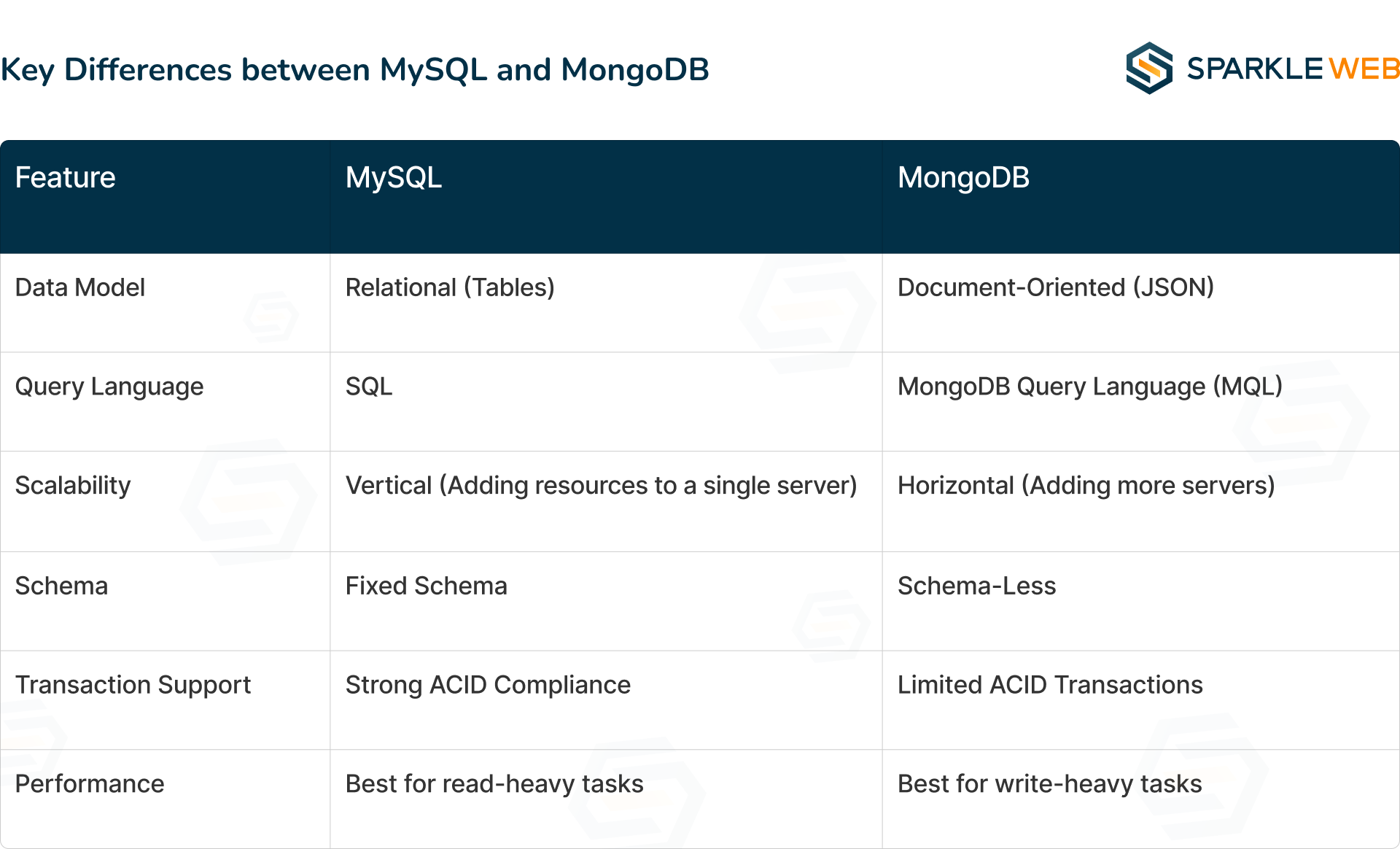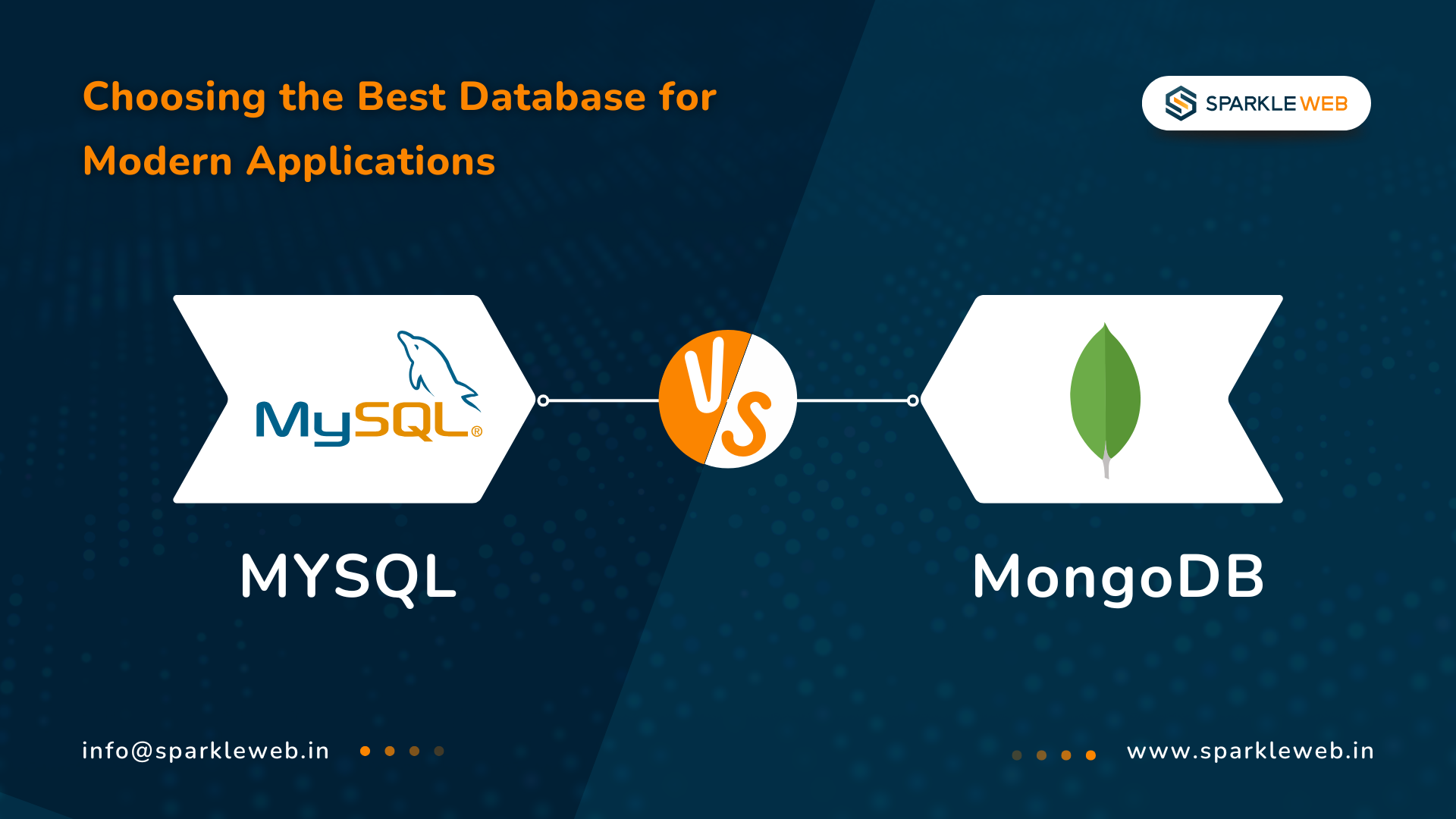1. Understanding MySQL and MongoDB
What is MySQL?

Key Features of MySQL
-
Schema-Based Structure: MySQL uses a predefined structure, so all data must fit into tables with specific rules.
-
ACID Compliance: This ensures that transactions are reliable, even if the system crashes or something goes wrong.
- Best for Complex Relationships: It’s perfect for applications where data has many links, like managing orders and customers in an e-commerce system.
Example Use Case
What is MongoDB?

Key Features of MongoDB
-
Schema-Less Structure: There’s no fixed structure, so the data can change dynamically as your application grows.
-
Horizontal Scalability: MongoDB can handle massive datasets by distributing data across multiple servers.
- Great for Real-Time Processing: It’s designed to handle data that changes frequently or is unstructured.
Example Use Case
2. Key Differences Between MySQL and MongoDB

3. When to Use MySQL or MongoDB
When to Use MySQL
-
E-commerce Platforms: Managing orders, payments, and inventory where relationships between data are important.
-
Finance Applications: Financial transactions require strong reliability and data consistency.
- Content Management Systems (CMS): Great for organizing and retrieving structured data like articles and metadata.
When to Use MongoDB
-
Real-Time Analytics: Perfect for applications that process and analyze large amounts of unstructured data.
-
IoT Applications: Handles the constant flow of diverse data from smart devices.
- Social Media Apps: Designed for managing dynamic, user-generated content like posts, likes, and comments.
4. Pros and Cons of MySQL and MongoDB
Advantages of MySQL
-
Mature Technology: MySQL has been around for decades and has a large community of support.
-
Relational Model: Excellent for managing data with strong relationships, like orders and customers.
- Compatibility: Works well with many programming languages like PHP, Python, and Java.
Challenges of MySQL
-
Lack of Flexibility: Not ideal for unstructured data that doesn’t fit neatly into tables.
-
Scaling Limitations: Adding resources to a single server can only go so far.
Advantages of MongoDB
-
Flexible Data Model: Easily handles changes in data structure without requiring a redesign.
-
Fast Write Operations: Excels in applications where data is constantly being added.
- Scalable: Can spread data across multiple servers to handle massive amounts of data.
Challenges of MongoDB
-
Steeper Learning Curve: Developers familiar with SQL may find MongoDB’s query language harder to learn initially.
-
Limited ACID Transactions: Not as reliable for handling complex transactions where data consistency is crucial.
5. Cost Considerations
6. Which Database is Best for Modern Applications?
Best Database by Industry
Healthcare
-
MongoDB for unstructured patient data like scans or reports.
-
MySQL for structured data like patient records.
Fintech
- MySQL is the best choice for ensuring reliable and secure transactions.
E-commerce
-
MySQL works well for managing product catalogs.
-
MongoDB shines for handling dynamic user interactions like reviews.
Best Database by Project Length
Long-Term Projects
- MySQL is ideal for stability and fixed data structures.
Short-Term Projects
- MongoDB offers faster setup and easier adjustments for changing needs.
7. Real-World Examples
Companies Using MySQL
-
Facebook: Manages structured user data efficiently.
-
PayPal: Ensures secure and reliable financial transactions.
Companies Using MongoDB
-
Uber: Processes real-time ride requests and driver availability.
-
eBay: Handles large amounts of unstructured product data.
8. Conclusion
-
Go with MySQL if you need structured data, reliable transactions, or a mature system.
-
Choose MongoDB if flexibility, scalability, or handling unstructured data is more important.
Contact us today to build an application that meets your business needs perfectly!



Dipak Pakhale
A skilled .Net Full Stack Developer with 8+ years of experience. Proficient in Asp.Net, MVC, .Net Core, Blazor, C#, SQL, Angular, Reactjs, and NodeJs. Dedicated to simplifying complex projects with expertise and innovation.
Reply